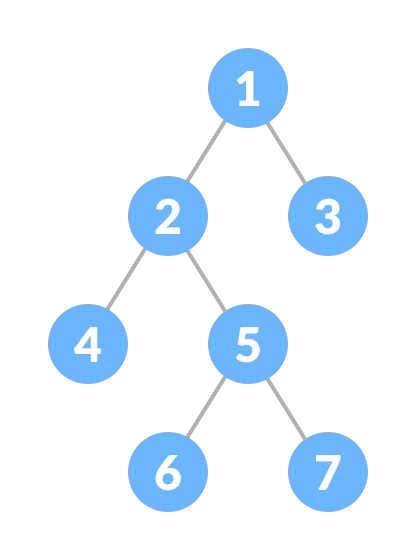Introduction
This blog will discuss the various approaches to solving the Sum of the distance of all Nodes from a given node problem. Before jumping into the problem to get the Sum of the distance of all Nodes from a given node in a binary tree, let’s first understand what is a binary tree,
A binary tree data structure is a type of tree of data structure in which a node can have at most two children commonly known as the left and right child of the node. Its class has three data members which are as follows:-
- Data
- Left Node pointer
- Right Node pointer

For more information on binary trees, refer to Introduction to Binary Trees.
In this problem, we need to find the sum of the distance of each node from a given node.
For Example:-
Binary Tree:-

Target Node:- 3
Output:- 14
Brute Force Approach
The brute Force Solution considers calculating the depth and the total number of nodes and then with the help of this information, we need to calculate the sum of the distances of all nodes from a given node.
Algorithm
Step 1. Create a function ‘getResult()’ that will accept four parameters, i.e., one pointer to the root of the binary tree, second will be the target node, third will be the sum of the depth, and fourth will be the number of nodes.
Step 2. Create a function ‘sumofDepth’ to find the sum of all the depths of a node and a variable named ‘sum’ which will denote the sum of the distance of all nodes from the given target node.
Step 3. Now we need to traverse the whole binary tree using DFS Algorithm and for each node, we have to check for that node
- If it is the target node given by the user then we need to update the ‘sum’ as the distance
Else,
- If the left node of that particular root is not null, then, calculate the total number of nodes in the left subtree and send the value of ‘sum’ as ‘tempsum’.
- If the right node of the root is not null, then, calculate the total number of nodes in the right subtree and send the value of ‘sum’ as ‘tempsum’.
Step 4. If we detect the target node, then print the sum of the distances of nodes from that target node.
Implementation in C++
#include <bits/stdc++.h>
using namespace std;
// TreeNode Class
class TreeNode
{
public:
int data;
// Left Child of the Node
TreeNode* left;
//Right Child of the Node
TreeNode* right;
};
// Add new node to the tree
TreeNode* push(int data)
{
// Allocate the node
TreeNode* Node = new TreeNode();
// Allocate Memory
Node->data = data;
Node->left = NULL;
Node->right = NULL;
return (Node);
}
// Function to calculate the total sum of depths of all nodes
int depth(TreeNode* root, int x)
{
// Base Case for this function
if (root == NULL)
{
return 0;
}
// Return recursively
return x + depth(root->left, x + 1) + depth(root->right, x + 1);
}
// Function to count the total number of nodes in the left and right subtree of a given Node
int countNodes(TreeNode* root)
{
// Base Case
if (root == NULL)
{
return 0;
}
// Return recursively
return countNodes(root->left) + countNodes(root->right) + 1;
}
int sum = 0;
// Function to find sum of distances
// of all nodes from a given node
void getResult(TreeNode* root, int target, int distancesum, int n)
{
// If target node matches
// with the current node
if (root->data == target)
{
sum = distancesum;
return;
}
// If left of current node exists
if (root->left)
{
// Count number of nodes in left subtree
int nodes = countNodes(root->left);
// Update sum
int tempsum = distancesum - nodes + (n - nodes);
// Left Subtreee
getResult(root->left, target, tempsum, n);
}
// If right is not null
if (root->right)
{
// Find number of nodes in right subtree
int nodes = countNodes(root->right);
int tempsum = distancesum - nodes + (n - nodes);
// For right subtree of the node
getResult(root->right, target,tempsum, n);
}
}
// Driver Code
int main()
{
// Input tree
TreeNode* root = push(1);
root->left = push(2);
root->right = push(3);
root->left->left = push(4);
root->left->right = push(5);
root->right->left = push(6);
root->right->right = push(7);
root->left->left->left = push(8);
root->left->left->right = push(9);
int target = 3;
// Sum of Depth
int distanceroot = depth(root, 0);
// Number of nodes in the left and right subtree
int totalnodes = countNodes(root);
getResult(root, target, distanceroot, totalnodes);
// Print the sum of distances
cout << "Sum of the distance of all nodes from a given node is:- " << sum << endl;
return 0;
}
Output :
Sum of the distance of all nodes from a given node is:- 19Complexity Analysis
Time Complexity: O(N * N)
Incall to ‘getResult()’, we are traversing the binary tree using DFS and calculating all nodes and the depths, therefore, the overall time complexity is O(N * 2).
Space Complexity: O(N)
As we are using constant extra space, therefore, the overall space complexity will be O(1).




